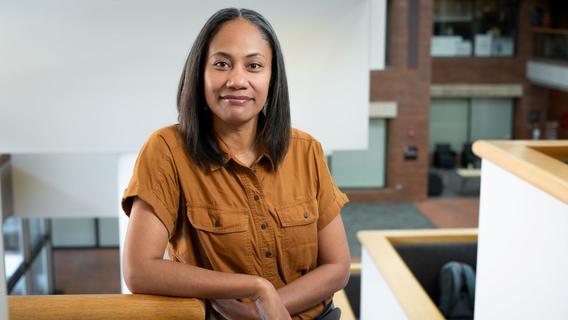
By Ann Nordby
How do governments decide which public projects to fund? Which private projects to allow? How do these projects affect vulnerable people? Policy decisions like these have vast implications. Understanding their impact on communities depends to a large extent on evaluating data.
Program evaluation is an important skill, explained Mere Nailatikau, a second-year student in the Master of Public Policy (MPP) program at the Humphrey School of Public Affairs. It reveals what is working, what is not working, and for whom.
"Demystifying wicked problems makes them seem a little less intractable," she said.
Nailatikau had never thought of herself as a "statistics person." In her career as a nonprofit communications professional, she had focused on qualitative data. She used it to tell stories about education, climate change, and culture in her home country of Fiji. Now she wants to address national challenges from a broader perspective.
Armed with new skills in statistics, she hopes to influence governments to adopt policies that serve their communities well. She will do that by shedding light on facts that lie beneath the surface. Among other things, she hopes to build a demographics database for her home country.
Grown to 'love statistics'
Nailatikau said she was surprised how much she appreciated statistics once she learned to work with them.
"It was an approach I had been thirsting for," she said. "In Fiji, data is largely inaccessible, making it hard to know what is there and what isn't. This has been like an oasis in the desert for me. I didn't expect that, but I have grown to love statistics."
Fiji is a multiethnic country with almost 1 million residents. An island nation in the south Pacific, it has a rich cultural history. Aid is a thriving industry across the Pacific, with myriad powerful actors. Foreign aid and foreign investment loom large in Fiji's economy. Aid is controlled by a few large national donors. As in any country, the needs and wants of local people can be opaque unless studied.
Fiji limits public access to data about the impact that large projects have on various population groups. Like many countries, it struggles with how to deal with race and achieve democratic parity across ethnicities. In an effort to dampen racial tensions, it has discouraged studying racial data. Although the goal is equal treatment, the lack of access to data has obscured inequities.
The Humphrey School's renowned MPP program trains future government leaders from around the world in specialized skills to advance the common good. Students gain the analytical skills to address societal problems through policy. "Statistics for Public Affairs" is a required course.
Since coming to the Humphrey School, Nailatikau has honed her public policy skills through coursework and an internship at the Minnesota Department of Management and Budget (MMB). At MMB she evaluated pilot programs that offer social safety nets for people in need.
"The experience was eye-opening," she said, because it gave her a new appreciation for the value of human services.
Humphrey School is the right place
Nailatikau explained that just as a person has a right to see their own medical exam results, a nation has the right to understand itself through data. The University of Minnesota has turned out to be just the right place for her to indulge her curiosity and learn new things.
"There's an extremely rich community-based nonprofit environment here. I come from a place where it's the exact opposite, with a few giant nonprofits dominating, so it's hard to understand how to manage them in the country."
She also appreciated a racial equity assessment course she took, in which she is applying her newfound skills, and which is the topic of her final paper.
"That course really helped me to understand issues faced by many countries, including mine, in terms of how we see race and ethnicity," she said.
The "Management of Organizations" class helped her to evaluate her own career so far and recognize the dynamics at play. She learned how organizational contexts affect her, and how she affects them.
MPP has the largest cohort at the Humphrey School, with about 70 students. Nailatikau said classmates and faculty have been great resources, both academically and personally. She feels at home in Minnesota, whose outdoor life and laid-back residents remind her of home – despite the difference in climate.
"The Humphrey School is actually a super busy and social place. There are so many wonderful talks, poetry readings, teach-ins, issues to learn about and community tours, there's just not enough time to do them all."
Her love of the UMN campus is evident. Last year, she received the Jernberg Award, which goes to the Humphrey School student who contributes the most to student life, as voted by fellow students. It recognized her work with the University’s Student Union, organizing for safe and fair work practices for student workers. She also participated in two student panels, telling prospective students about her own experience.
"We all encounter or are part of organizations, and it’s easy to take them for granted,” she said. “Understanding ourselves and how best we can operate, whether it’s part of a community, a network or as an employee, is important.”

